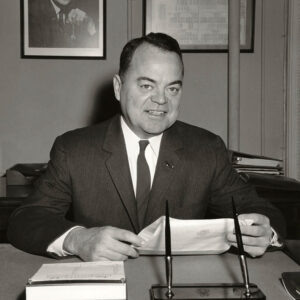calsfoundation@cals.org
William F. Finan Jr. (1913–1974)
William Francis Finan Jr. served on Carl E. Bailey’s staff at the Sixth Judicial District Prosecutor’s Office from 1933 to 1936. After working to secure Bailey’s election as governor in 1936, Finan became assistant director of the State Personnel Division in May 1937 and acting director from August 1938 until January 1939, overseeing implementation of Arkansas’s first civil service.
William F. Finan Jr. was born on February 11, 1913, in Memphis, Tennessee, to William F. Finan, who was a plumbing supply salesman, and Minnie Agnes Nathan Finan of Little Rock (Pulaski County). He was the oldest of seven siblings. He attended McBride High School in St. Louis, Missouri, and learned shorthand and typing at a school in Little Rock in 1930–1931. In 1936, he took one semester of night classes at the Arkansas Law School in Little Rock. On November 13, 1937, he married Helen Katherine McDonald of Little Rock; they had two children, Patricia Ellen and William F. III.
In July 1933, Finan joined the Sixth District Prosecuting Attorney’s Office headed by Carl E. Bailey. In mid-1936, after Bailey decided to run for governor, Finan campaigned statewide for him. The “Last Week” column of the Arkansas Democrat in August 1936 recorded how Finan “had hitched his wagon years earlier to Bailey’s rising star…Mr. Finan was [Bailey’s] private secretary and Mr. Finan will be a member of his staff when Bailey assumes office.”
In February 1937, Governor Bailey passed a landmark merit reform law establishing the State Personnel Division, which oversaw creation of the state’s first civil service system. Bailey appointed Kenneth Warner as director. After passing a civil service examination and ranking first, Finan was selected by Warner to become assistant state personnel director in July 1937. When Warner resigned in August 1938, Bailey appointed Finan acting director.
In late 1938, the state’s new civil service system came under what Finan called a “vicious attack” by members of the Arkansas General Assembly, who wanted to return to the former unregulated patronage system. During this period, Finan worked closely with Gussie Haynie, head of the Department of Public Welfare, to ensure that Arkansas continued to qualify for matching federal Social Security grants, which significantly benefited the state’s elderly, needy, and disabled. Finan spoke all over the state attempting to rally public support behind civil service. In January 1939, the General Assembly took up legislation to repeal Bailey’s 1937 merit reform law. He lobbied members on the floor of the Arkansas Senate and the House against repeal. The Arkansas Gazette wrote, “Oddly enough, even speakers against civil service commended State Personnel Director William F. Finan…for his honest efforts.” Despite his efforts, merit reform was repealed, a “victim of patronage-seeking politicians.” Finan resigned in March, predicting that the people of Arkansas “will rebel against the costly patronage system,” as the Arkansas Gazette reported on March 10. His optimism was misplaced; it took another thirty years before the state again adopted a civil service for government employees. Finan never worked in Arkansas again.
In May 1939, Finan joined the Public Administration Service (PAS), a Chicago-based non-profit organization that provided technical assistance to states and municipalities implementing merit reforms, including Arkansas’s. Finan advised the state governments of Louisiana and Alabama, among others.
In 1940, Finan moved to Washington DC to join the Bureau of the Budget. During World War II, from 1943 to 1945, he served on the staff of the Army’s Military Intelligence Service under a highly classified program called ULTRA, handling decrypted German military and Japanese diplomatic messages. In 1945, promoted to the rank of major, he was assigned to the staff of General George C. Marshall and attended the Yalta and Potsdam conferences as the sole intelligence officer present. After the war, he served briefly in the State Department, helping establish an intelligence function that later became the nucleus for the Central Intelligence Agency (CIA). Rejoining the bureau, he became assistant director for Management and Organization in 1950. He oversaw the creation of the Department of Health, Education, and Welfare; twice coordinated reorganization of the Defense Department; and, in March 1958, coordinated drafting the legislation establishing the National Aeronautics and Space Administration (NASA).
For his military service, Finan was awarded the Legion of Merit for duties described in the citation as secret because the existence of ULTRA had not yet been declassified. In 1959, he received the National Civil Service Award recognizing him as a “key assistant [to the president]” for his role in advising Presidents Truman and Eisenhower.
Leaving public service in 1961, he joined the Logistics Management Institute, a non-profit organization advising the Defense Department, becoming its president from 1968 until 1973.
Finan died on January 19, 1974, in Bethesda, Maryland, of colon cancer; he is buried at the Parklawn Cemetery in Rockville, Maryland.
For additional information:
“February 1 May See Shutdown of Civil Service.” Arkansas Gazette, January 25, 1939, p. 1.
Finan, William F., III. “The Budget Bureau’s Administrative Doctrine and the Creation of an Independent NASA, 1958.” Federal History Journal, April 2023.
Holley, Donald. “Carl E. Bailey, the Merit System and Arkansas Politics, 1939–1939.” Arkansas Historical Quarterly 45 (Winter 1986): 291–320.
“News About People.” Arkansas Democrat, August 16, 1938, p. 3.
“News About People” Arkansas Democrat, March 10, 1939, p. 3.
“Resignation of Dr. K. O. Warner Announced Here.” Arkansas Gazette, August 12, 1938, pp. 1, 24.
William Finan
Miami, Florida
 Early Twentieth Century, 1901 through 1940
Early Twentieth Century, 1901 through 1940 Politics and Government
Politics and Government William F. Finan Jr.
William F. Finan Jr. 




Comments
No comments on this entry yet.